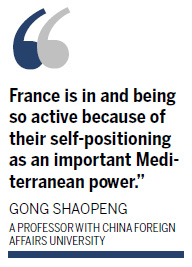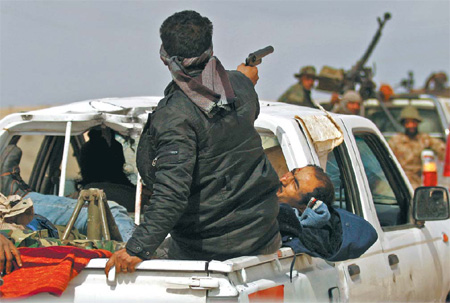Top News
Opposition to Libya attacks grows
Updated: 2011-03-22 10:49
(China Daily)
|
|
 |
BEIJING - As American and European forces fired missiles and dropped bombs against Muammar Gadhafi's forces in Libya, opposition to the intervention grew louder from several nations in the international community.
Leaders from China, Turkey, Russia, Germany and the Arab League questioned the right for American and European troops to use force and decried the aim behind the intervention.
As questions arose over the goal of the intervention and how long it will last, Western forces launched a second wave of air strikes on Libya overnight. Officials loyal to Gadhafi said a missile intended to kill the embattled leader destroyed a building in his fortified compound.
"It was a barbaric bombing," said government spokesman Mussa Ibrahim, who showed pieces of shrapnel that he said came from the missile. "This contradicts American and Western (statements) ... that it is not their target to attack this place."
Related comment:Politics behind attacks on Libya
The first air strikes on Saturday halted the advance of Gadhafi's forces on the rebel-held eastern city of Benghazi and had targeted Libya's air defenses.
The second wave of Western air strikes also hit Gadhafi's troops around Ajdabiyah, a strategic town in the barren, scrub of east Libya.
Related:Libyan capital under 3rd round of airstrikes
Western allies have made it clear that they want Gadhafi to cease all attacks on civilians and withdraw his forces from key cities in Libya. But as the forces prepared to continue the intervention, confusion spread among NATO members after they held a marathon of meetings in Brussels on Monday. Leaders were unsure on how the alliance would participate in enforcing a no-fly zone over the North African country.
On Sunday, NATO approved of plans to help enforce a UN arms embargo against Libya, but it has not been able to agree on how to proceed. Among the 28 NATO members that have veto power, the United Kingdom, France and the United States have launched strikes on Libyan targets on Saturday and Sunday.
Among the loudest voices in the opposition to attacks on Gadhafi's forces is Germany, which made it clear that it won't join the action. Rolf Mtzenich, foreign policy spokesman for The Social Democratic Party of Germany, criticized on Monday the decision of the country's foreign minister to categorically rule out the threat of a no-fly zone as a mistake.
"By doing so, he unnecessarily tied our hands and our ability to negotiate," Mtzenich said.
Gong Shaopeng, a professor with China Foreign Affairs University, compared the strikes to the 1999 Kosovo war.
Although the US is hardly beginning a "third foreign war" under domestic pressures, he said, it's not possible for the international troops to achieve the goal of overturning Gadhafi's government if they do not send ground forces into Libya.
"The US is hoping to fight another Kosovo war with Libya, topple Gadhafi without too much involvement abroad, but it depends on whether Gadhafi is another Slobodan Milosevic or Saddam Hussein - if he chooses to hide underground, how can they win by not sending ground forces?"
Specials

Tea-ing up
More turning to Chinese tea for investment opportunities like vintage wine

A cut above
The ancient city of Luoyang is home to a treasure trove of cultural wonders.

Rise and shine
The Chinese solar energy industry is heating up following recent setbacks in the nuclear sector
